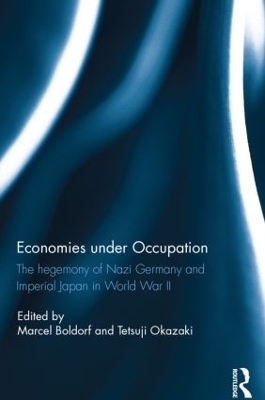
Economies under Occupation
Routledge (Verlag)
978-0-415-83533-6 (ISBN)
The unbalanced economic and financial relations were defined by administrative control, the implementation of institutions and a variety of military exploitation strategies. Plundering, looting and requisitions were frequent aggressive acts, but beyond these interventions by force, specific institutions were created to gain control over the occupied economies as a whole. An appropriate institutional setting was also crucial to give incentives to the companies in the occupied countries to produce munitions for the aggressors. The book explains the main fields of war exploitation (organisation and control, war financing and workforce recruitment). It substantiates these aspects in case studies of occupied countries and gives examples of the business policy of multinational companies under war conditions. The book also provides an account of differences and similarities of the two occupation systems.
Economies under Occupation will interest researchers specialising in the history of economic thought as well as in economic theory and philosophy. It will also engage readers concerned with regional European and Japanese studies and imperial histories.
Marcel Boldorf is Professor at Université Lyon 2 Lumière. His research focuses on German economic history in the twentieth century and the occupation of European countries, especially France, in World War II. Further research interests are the institutional analysis of industrialisation and social and welfare policies. Tetsuji Okazaki is Professor of Economic History at Graduate School of Economics, The University of Tokyo. His research focuses on institutional analysis of the Japanese economic development, including such topics as wartime planning and control, the role of industrial policies in the postwar period and the role of the capital market and business groups in the prewar period.
1. Introduction, Marcel Boldorf and Tetsuji Okazaki Part 1: The System of Occupation 2. The European Economies under National Socialist Rule, Marcel Boldorf 3. Strategies and Organizations for Managing the "Greater East-Asia Co-Prosperity Sphere", Tetsuji Okazaki Part 2: War Financing 4. The German System of Financing Occupation, Jonas Scherner 5. Paying for War, 1941–1945: How Japan Financed Southeast Asia’s Occupation, Greff Huff and Shinobu Majima Part 3: Exploiting the Foreign Labour Force 6. Forced Labour in Occupied Europe, Mark Spoerer 7. Development of Labor Policy in "Manchukuo" and its Limit, 1933–1943, Toshio Kojima Part 4: Incorporation of Territories in the War Economy 8. The French Economy under German Occupation, 1940–1944, Marcel Boldorf 9. German economic rule in occupied Belgium, 1940–1944, Dirk Luyten 10. Nazi Germany’s financial exploitation of Norway during the occupation, 1940–1945, Hans-Otto Froeland 11. The Incorporation of the General Government in the German War Economy, Stephan Lehnstaedt 12. The Protectorate of Bohemia and Moravia under German Control, 1939–1944, Harald Wixforth 13. The Development and Management of the Manchurian Economy under Japan's Empire, Tetsuji Okzaki 14. The Philippine Economy during the Japanese Occupation, 1941–1945, Gerardo P. Sicat 15 The Eclipse of the Indonesian Economy under Japanese Occupation, Thomas Lindblad 16. The Burmese Economy under the Japanese Occupation, 1942–1945, Michael Charney and Atsuko Naono 17. Indochina during World War II: An Economy under Japanese Control, Delphine Boissarie Part 5: Multinationals Acting in Occupied Economies 18. German Steel Industry’s Expansion in Occupied Europe: Business Strategies and Exploitation Practice, Ralf Ahrens 19. The French Opportunity: A Danish Construction Company working for the Germans in France, 1940–1944, Steen Andersen 20. Management of the South Manchurian Railway Company, Tsutomu Hirayama 21. Shanghai's Cotton Textile Industry during the Pacific War: Exploring Relations with Japan and the Transformation of the Economic Structure, Narumi Imai 22. Conclusion: Differences and Similarities of the Two Occupation Regimes, Marcel Boldorf and Tetsuji Okazaki
| Zusatzinfo | 30 Tables, black and white; 10 Line drawings, black and white; 10 Illustrations, black and white |
|---|---|
| Verlagsort | London |
| Sprache | englisch |
| Maße | 156 x 234 mm |
| Gewicht | 657 g |
| Themenwelt | Geschichte ► Allgemeine Geschichte ► Neuzeit (bis 1918) |
| Geschichte ► Allgemeine Geschichte ► 1918 bis 1945 | |
| Geisteswissenschaften ► Geschichte ► Regional- / Ländergeschichte | |
| Geschichte ► Teilgebiete der Geschichte ► Wirtschaftsgeschichte | |
| Sozialwissenschaften ► Soziologie ► Spezielle Soziologien | |
| Wirtschaft ► Allgemeines / Lexika | |
| Wirtschaft ► Volkswirtschaftslehre | |
| ISBN-10 | 0-415-83533-X / 041583533X |
| ISBN-13 | 978-0-415-83533-6 / 9780415835336 |
| Zustand | Neuware |
| Haben Sie eine Frage zum Produkt? |
aus dem Bereich


